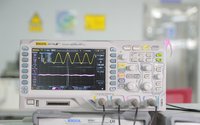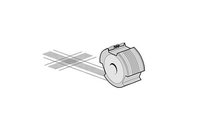Common instruments for material performance testing
Date:2023-08-28 15:24:00 Views:1718
The Material Testing Center is a third-party testing agency responsible for measuring, testing, analyzing, and environmental testing of raw materials to ensure the safety of materials and equipment, and evaluating the degree of contamination of survey materials. There are many common instruments in material performance testing, and this article will introduce several common material performance testing instruments.
1、 Tensile testing machine
A tensile testing machine is an experimental equipment used to test the tensile properties of materials. It usually consists of a fixed base and a moving crossbeam, with fixtures installed on the crossbeam for gripping material samples. During the testing process, the fixture will apply tension and gradually stretch the material sample, while measuring the stress and strain of the material to determine its mechanical properties.
Tensile testing machines are widely used in fields such as materials science, engineering, manufacturing, and construction. By conducting tensile tests on different materials, the strength, toughness, ductility, fracture toughness, and other properties of the materials can be evaluated, providing important references for material selection and design.
_20230828152256_307.jpg)
2、 Compression testing machine
Compression testing machine is an experimental equipment used to test the compressive performance of materials. It usually consists of a fixed base and a moving upper fixture, which is used to clamp material samples. During the testing process, the upper fixture will apply pressure to gradually compress the material sample, while measuring the stress and strain of the material to determine its mechanical properties.
Compression testing machines are usually used to test the compressive performance of materials such as metals, concrete, wood, and fiber reinforced composite materials. During the testing process, attention needs to be paid to the selection and installation of fixtures to ensure uniform distribution of clamping force, and appropriate testing speeds and loading methods need to be selected based on the characteristics of the material to obtain accurate testing results.
3、 Hardness tester
A hardness tester is a tool used to test the hardness of materials. It can measure the resistance of a material to external forces by applying a certain amount of pressure or impact to the material, thereby evaluating its hardness.
Common hardness testers include:
1. Brinell Hardness Tester: Calculate the hardness value by applying a certain pressure to the surface of the material and measuring the diameter of the indentation.
2. Vickers Hardness Tester: Calculate the hardness value by applying a certain amount of pressure to the material surface and measuring the diagonal length of the indentation.
3. Rockwell Hardness Tester: Calculate the hardness value by applying a certain amount of pressure to the surface of the material and measuring the depth of the indentation.
Hardness testers are widely used for hardness testing of various materials, including metals, plastics, rubber, ceramics, etc. In industrial production and scientific research, hardness testing is one of the important means to evaluate material properties.
4、 Impact testing machine
Impact testing machine is an experimental equipment used to test the impact resistance of materials. It simulates the reaction of materials under sudden impact by applying impact force to measure their impact resistance.
Impact testing machines typically consist of a heavy hammer and a supporting base. During the testing process, the material to be tested is placed on a support base, and then a heavy hammer is freely dropped from a certain height to impact the material. At the same time, the rebound height or impact force of the material is measured to determine its impact resistance performance.
Impact testing machines are usually used to test the impact resistance of materials such as metals, plastics, rubber, and glass. During the testing process, it is necessary to select appropriate impact energy and testing temperature based on the characteristics of the material, and pay attention to the preparation and installation of test samples to obtain accurate test results.
5、 Wear testing machine
A wear testing machine is a device used to test the wear performance of materials. It evaluates the wear resistance of materials by simulating their wear under different conditions.
Common wear testing machines include:
1. Plate type wear testing machine: Place the sample and grinding material on the same plane, and conduct wear testing under certain load and wear conditions. Evaluate the wear resistance of the material by measuring the weight loss or volume loss of the sample.
2. Rolling wear testing machine: Place the sample and grinding material in a rolling environment, and evaluate the wear resistance of the material by simulating its wear under rolling friction conditions.
3. Rotating disc wear testing machine: Place the sample on a rotating disc and evaluate the wear resistance of the material by simulating its wear under rotating friction conditions.
Wear testing machines are widely used in fields such as materials science, mechanical engineering, automotive industry, aerospace, electronics industry, etc.
After reading this article, have you gained more understanding of material performance testing instruments? That's all for today's content. If you find the content helpful, please follow Chuangxin Testing. We will provide you with more industry information.




 Weixin Service
Weixin Service

 DouYin
DouYin
 KuaiShou
KuaiShou





















